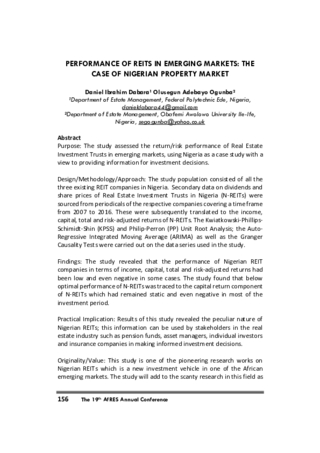Purpose: The study assessed the return/risk performance of Real Estate Investment Trusts in emerging markets, using Nigeria as a case study with a view to providing information for investment decisions.
Design/Methodology/Approach: The study population consisted of all the three existing REIT companies in Nigeria. Secondary data on dividends and share prices of Real Estate Investment Trusts in Nigeria (N-REITs) were sourced from periodicals of the respective companies covering a time frame from 2007 to 2016. These were subsequently translated to the income, capital, total and risk-adjusted returns of N-REITs. The Kwiatkowski-Phillips- Schimidt-Shin (KPSS) and Philip-Perron (PP) Unit Root Analysis; the Auto- Regressive Integrated Moving Average (ARIMA) as well as the Granger Causality Tests were carried out on the data series used in the study.
Findings: The study revealed that the performance of Nigerian REIT companies in terms of income, capital, total and risk-adjusted returns had been low and even negative in some cases. The study found that below optimal performance of N-REITs was traced to the capital return component of N-REITs which had remained static and even negative in most of the investment period.
Practical Implication: Results of this study revealed the peculiar nature of Nigerian REITs; this information can be used by stakeholders in the real estate industry such as pension funds, asset managers, individual investors and insurance companies in making informed investment decisions.
Originality/Value: This study is one of the pioneering research works on Nigerian REITs which is a new investment vehicle in one of the African emerging markets. The study will add to the scanty research in this field as well as equip both foreign and domestic investors with valuable information for investment decisions.
